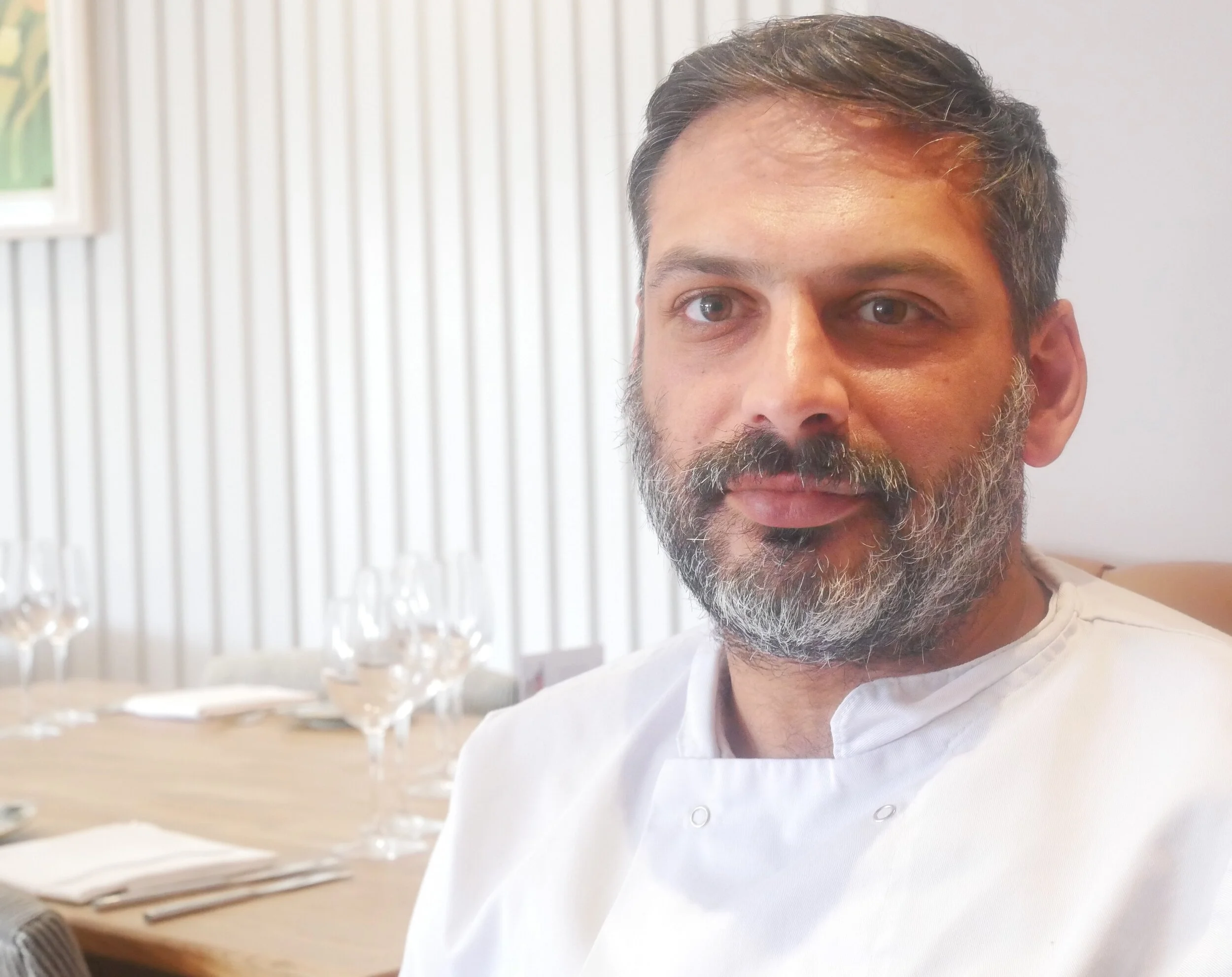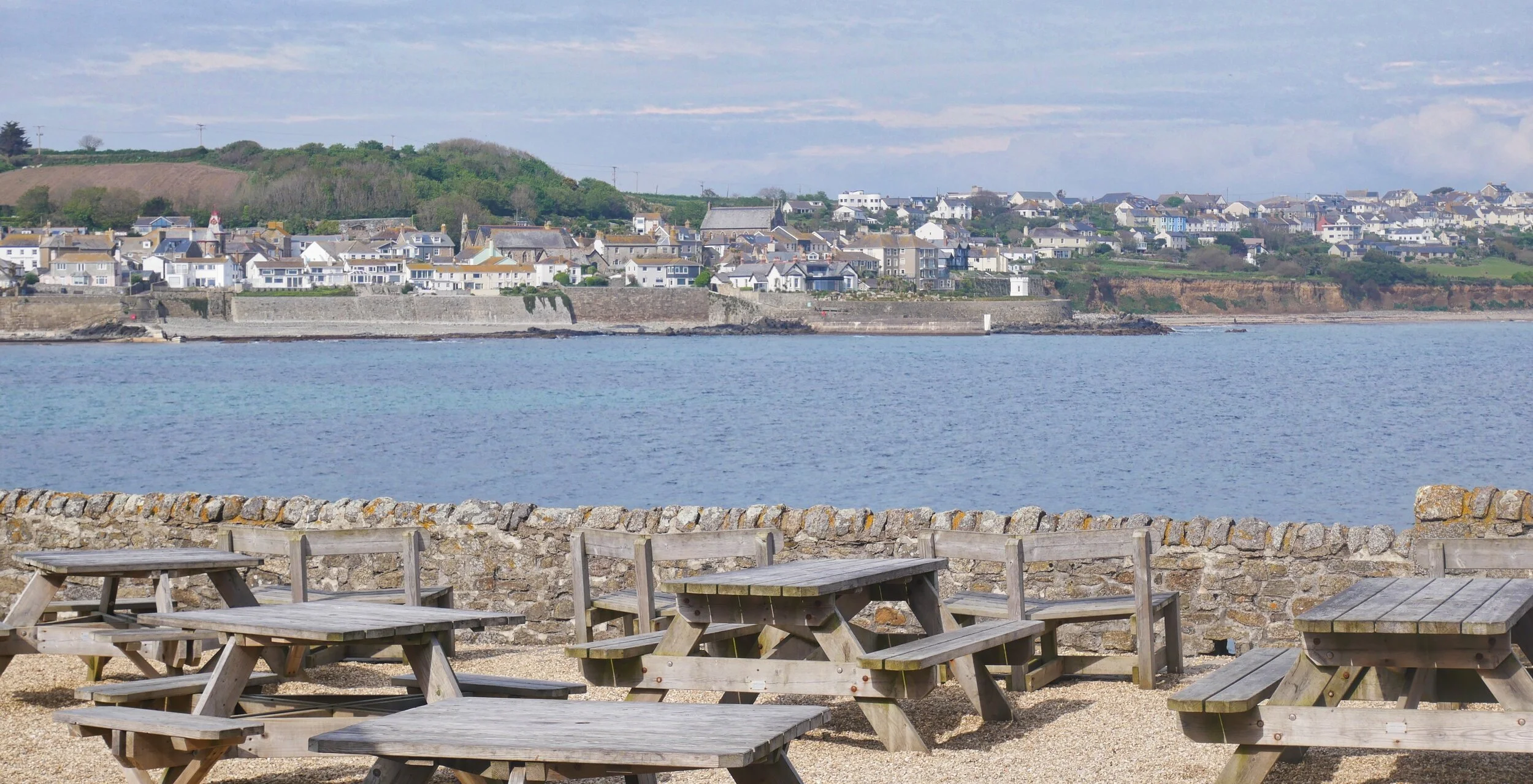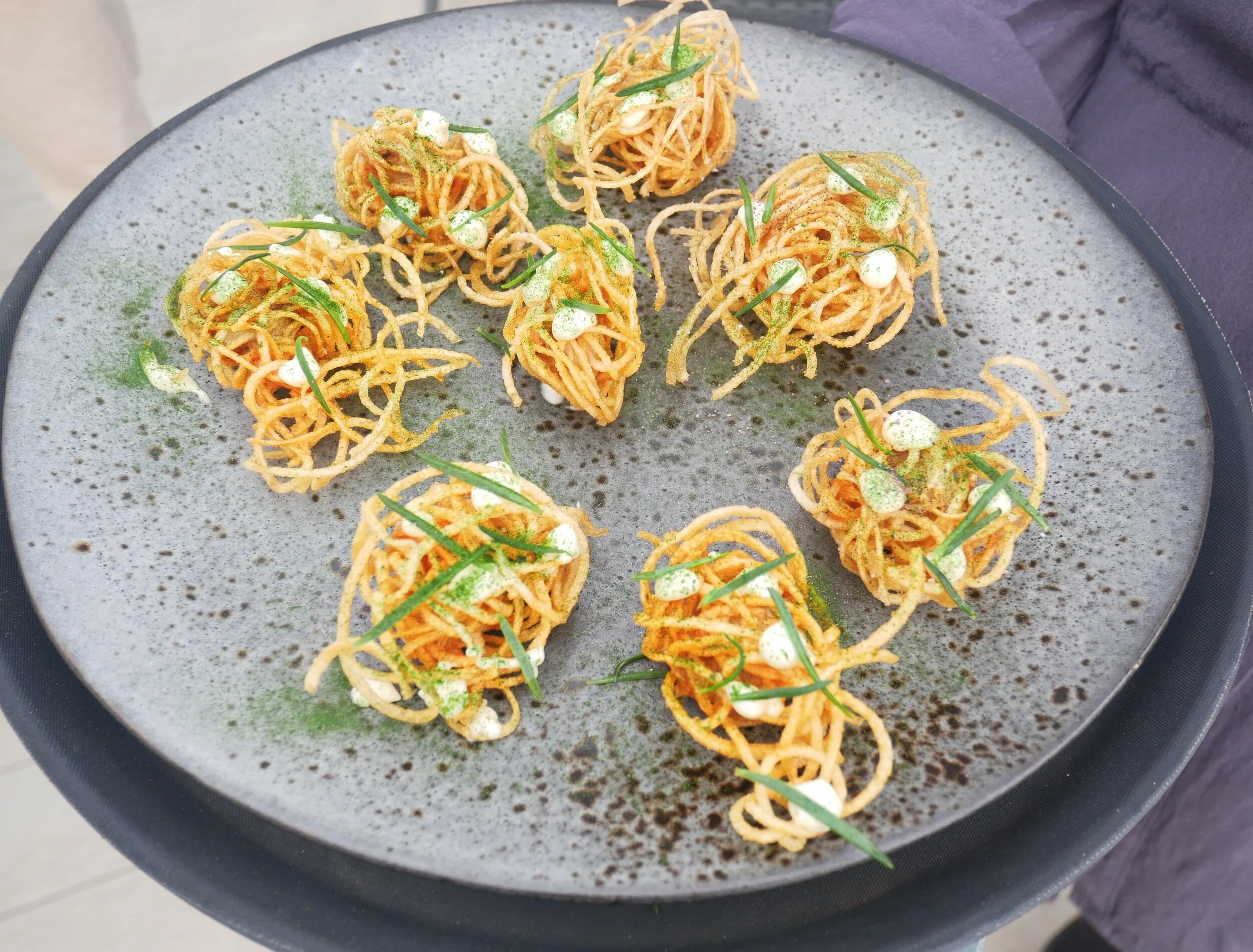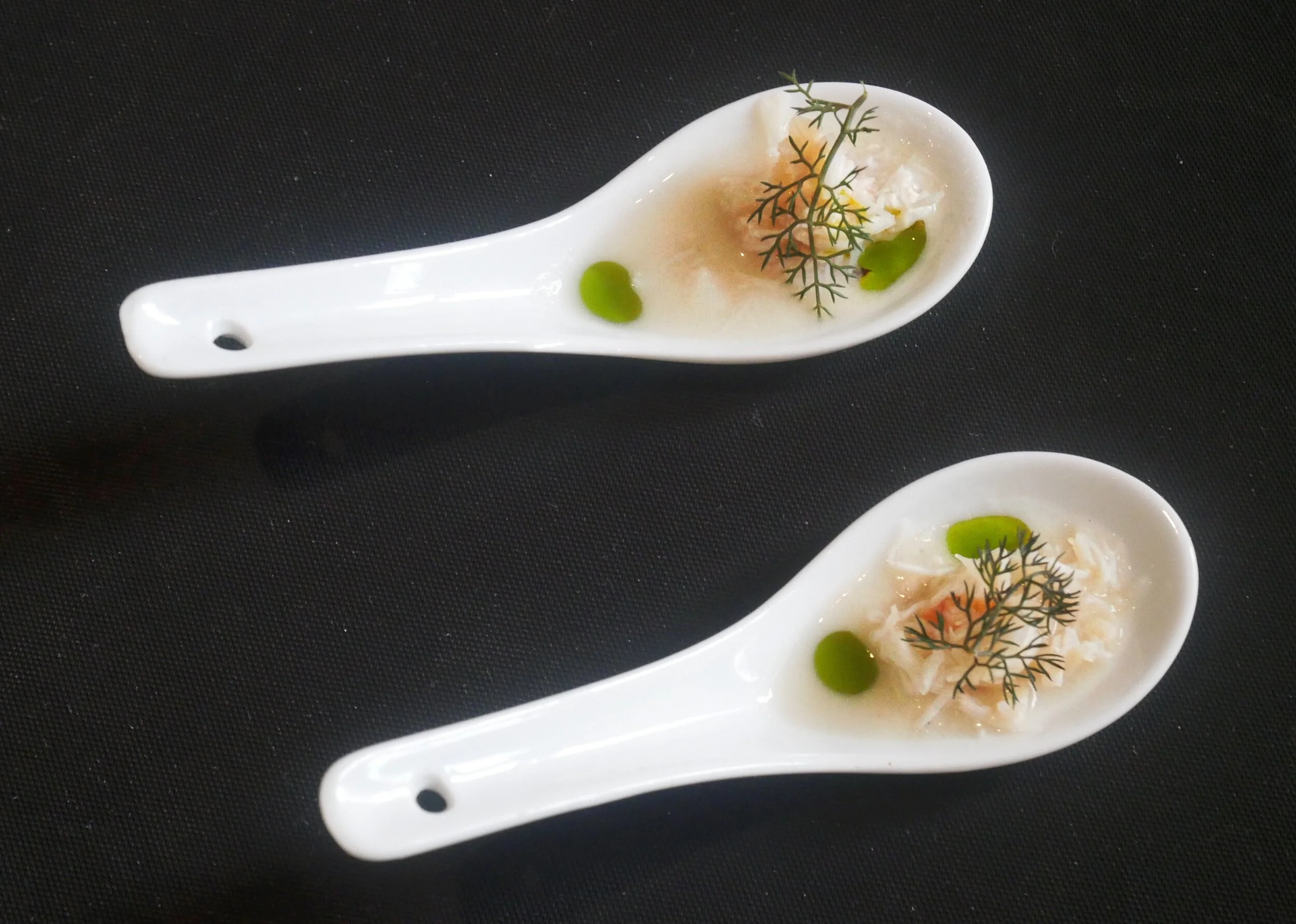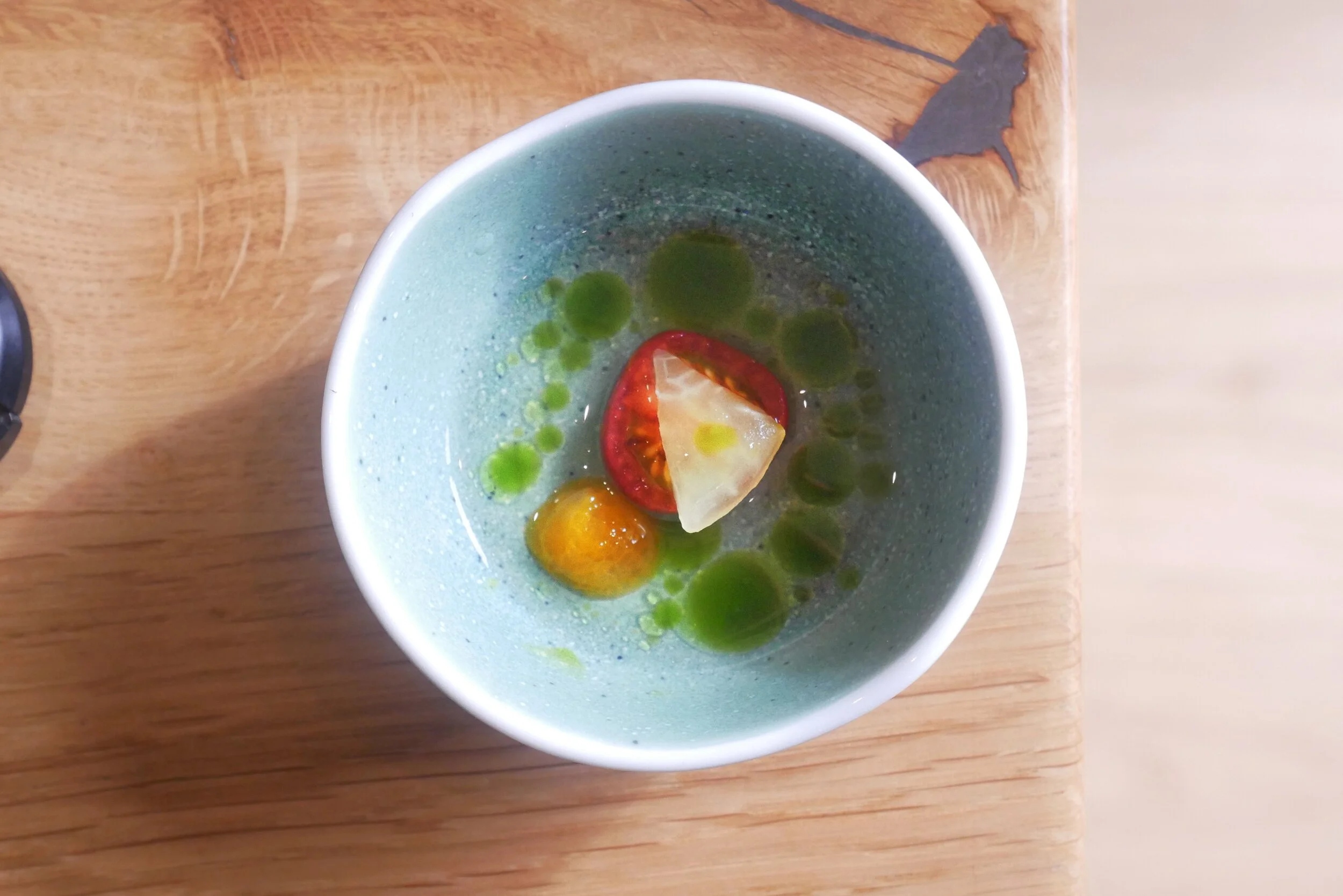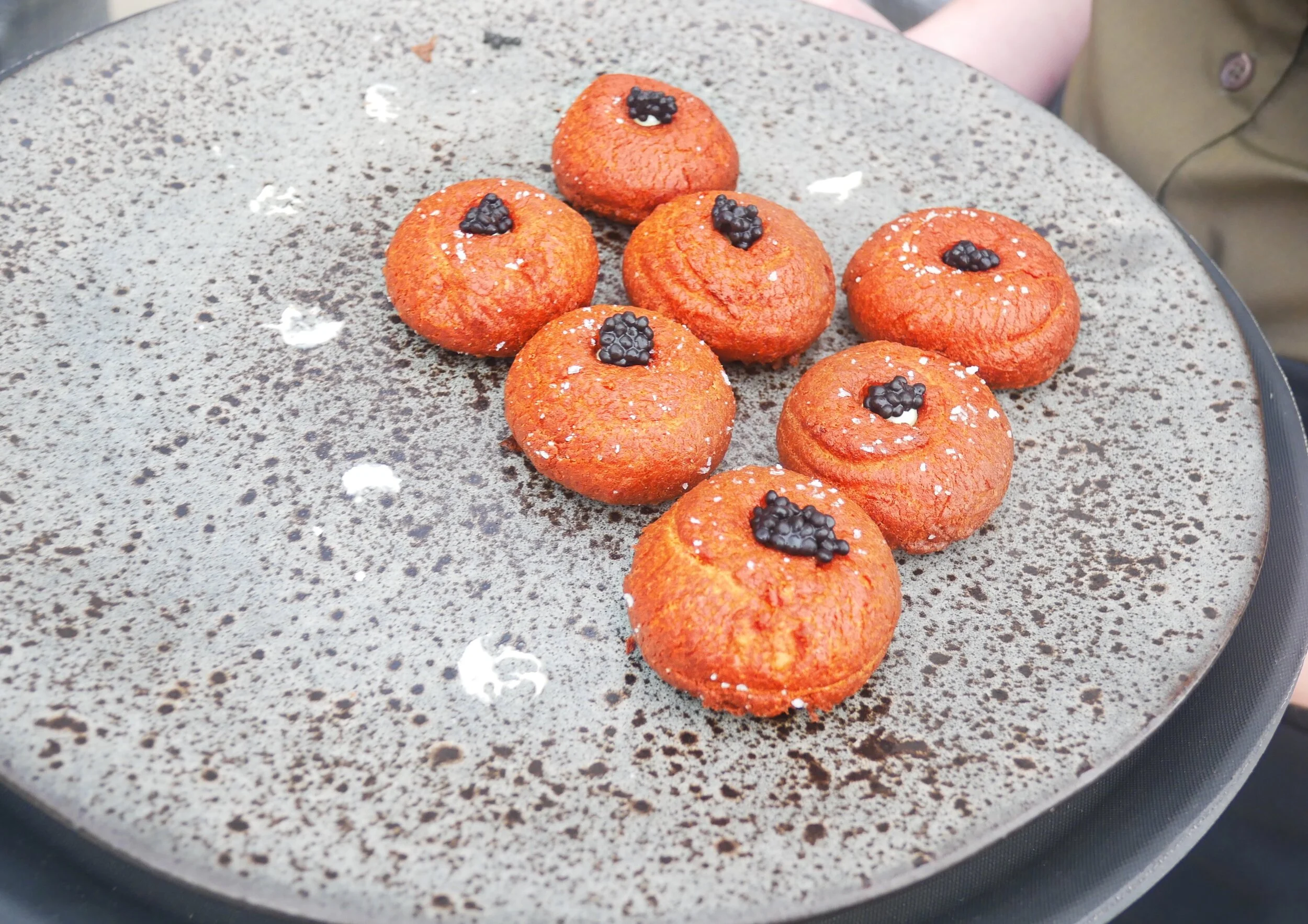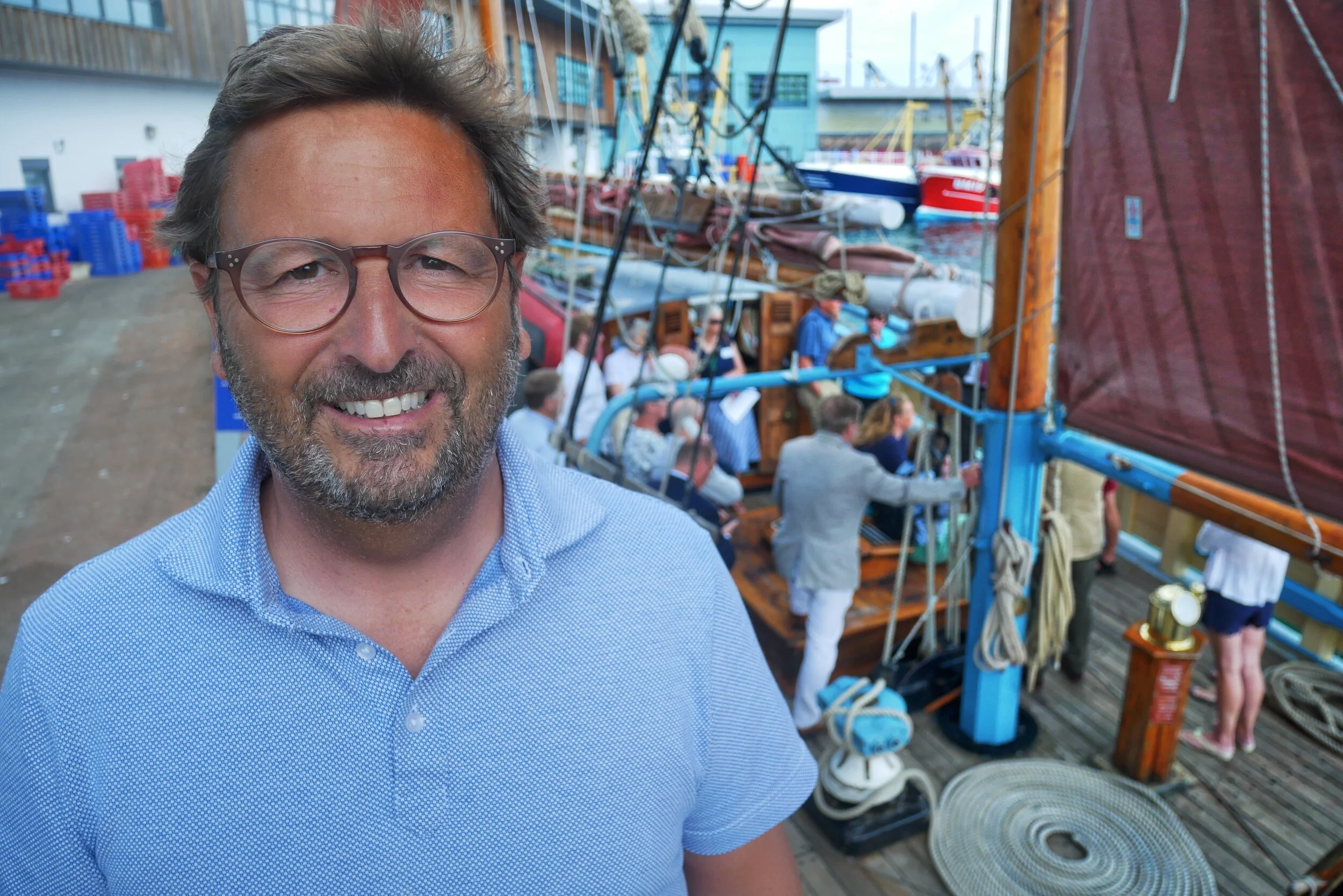Chefs: Ross Sloan, Landed, Porthleven, Cornwall
I wrote the article below about 18 months ago - the young chef, Ross Sloan, has now moved on to open up his own remarkable “shell-and-fish-takeaway” in Porthleven - and this website will be reporting on that enterprise in a week or so. In the meantime we publish the old article because Ross is a very talented chef and - like everyone in the catering industry at present - he could do with all the publicity he can get.
Some appetisers from Ross’s old restaurant at the Mount Haven - smoked goat cheese tarts
So take a look at Landed’s social media and then, if you’ve time, have a read of my old article below…
https://www.facebook.com/LandedPorthleven/
Sometimes you come across some kind of artist, expert, craftsman or woman and there’s something about their work which makes you think perhaps the person has got just that little bit more in the locker. A touch of magic, a streak of genius, call it what you will…
That is exactly what I thought one evening last year when I was dining alone in a hotel restaurant on the Cornish coast. The couple of dishes I ordered for my dinner were special - a cut above the rest. The cooking and presentation reminded me of food I’d recently enjoyed at a two-star Michelin rated restaurant where dinner cost five times the price.
View of Marazion from St Michael’s Mount
So when I was invited down to the same hotel - the Mount Haven at Marazion - for a special reception to celebrate the opening of its newly revamped and enlarged restaurant a few days ago, I grabbed the chance despite the fact that it meant a lengthy journey.
I wasn’t to be disappointed - and I say that even though all we ate that night were a large number of canapés dreamed up and prepared by the same chef. I use the phrase “dreamed up” advisedly, by the way, because Ross Sloan is no ordinary kind of chef and he is prone to “evolve” dishes by thinking way outside the box.
Another of Ross’s appetisers at Mount Haven - oysters in potato nests
Here’s the kind of thing you can expect to hear him say if you ever have a chance to speak with the 38-year-old: “There are so many things you keep finding. Like with fermenting or pickling - the best thing with it is not the pickles, but the left over vinegar. It’s amazing. It’s the best bit. You add the fermented juice of wild garlic and you think: wow!”
Ross is a slightly reticent interviewee, and I don’t blame him for that because it must be trying when inexperienced journalists and bloggers ask questions like: “What’s your favourite dish to cook.”
But get down to the nitty gritty - talk to Ross about the art of evolving dishes and the act of inventiveness when it comes to weird and wonderful tricks with the alchemy that is fermentation - and suddenly he is a human volcano of passion and ideas.
“You get one idea from a book - then you are getting offshoot ideas of your own,” he told me as we sat in the evening sunshine on the new terrace at the Mount Haven. “There is a transition. You can find yourself going backwards - back to nature based food using the old techniques of preserving stuff. So in a way it (modern cookery) has gone full circle.
Crab in a spoon
“So I go foraging when I can - I don’t have that much time but I know spots - and I have a lot of foraging notes so they help me out. I use a lot of seaweed. We store it, we dry it, we turn it into powders, we deep fry it. With kelp we use it as the basis for some of our stocks, like kombu. And we pickle it.
“With wild garlic… We got 50 kilos the other day and we are fermenting it because I’ve been making garlic leaf curd. 50 kilos of garlic to make a small ball. It’s like making curds and whey - you blitz it all up in a blender - bring it up to the boil and the proteins coagulate and separate. So it is a bit like making cheese. You end up with concentrated wild garlic which you can keep all year.
“So we get it when we can and use it all year round. It is a plant-based curd. But it is very labour-intensive. It is well worth it though because, with the whey, we make custards out of it which we pipe it onto tarts. It goes very well with mutton.”
Tomatoes reduction
By now Ross and I were getting on like a house on fire - first because of his passion and second because I am interested in that kind of cooking. Indeed, I believe it’s people like Ross who are - in their own very separate ways, individually and alone in their kitchens - starting to develop something that could be described as a true West Country cuisine. A type of cooking distinct from any other, wholly dependent on what grows and thrives in and around our warm wet peninsula.
“Nowadays when people come to Cornwall, they want to taste Cornwall,” said Ross - a statement with which I wholeheartedly agree. “I don’t want to go to a fishing village and eat a curry. It’s disheartening - but that’s what some people want. If I go to a fishing village I want to eat oysters, or pickled cockles or a mackerel bap.
“I do try to buy a cheaper fish as well as the expensive stuff. Pickled herrings are my favourite. White wine vinegar, sugar, salt, bit of water, spices… When you start preserving stuff, not only does it take on flavour, it is easier to digest, it can be better for you and things don’t go off.
“So there’s nothing going to waste and, even better, you are left with the fluid which tastes great. You could turn it (the pickled herring liquor) into a jelly, split it with a bit of whey or an oil…
Crab cakes with roe
“We do an oyster dish with rock samphire. We pickle that and use the vinegar with a bit of whey - which we get when we are making our own ricotta. We put the whey over the oysters and it is delicious.”
We talked a little about the career path that Ross has followed…. “I moved to Cornwall, to the Lizard, when I was 10. My father was a cook and he was Egyptian. No, that hasn’t influenced me. I’m about straight-up English based food and what’s around us. And there is a lot of Japanese influence in it - not Japanese dishes, but techniques.
“My first head chef job in Cornwall was at the Hazelphron Inn (on the Lizard) - and that was years ago. There wasn’t much competition around in those days. But now it’s different - especially on this coast. For a while it was the North Coast that had the name, but now this coast is getting there.
“I was in London chasing the dream,” Ross said of his later career-path. “The last job I was doing I wasn’t doing any cooking - just running restaurants.” And if there is one thing Ross obviously loves, it is being very much hands on in the kitchen. “I am a bit anal about how things look - but I do it one way, and the next day I don’t like it any more so we don’t it like that anymore. Dishes evolve. I either don’t like them anymore, or they will and get better and better.
“Here at the Mount Haven (which is owned and run by the St Aubyn Estate) we are starting to use more local farms. There’s a local organic farm and they bring stuff in fresh every morning. I’m starting to use different farms for different things. There’s a farm in Helston I get my pigs from. They’re butchered for us, but it’s the whole pig so we use everything. Where’s it going to go if you don’t use it? Everyone’s used to getting stuff in a plastic bag - and actually we want to see where it’s come from and use the whole beast, otherwise it is a waste. Some of those cuts are the most delicious bits. Pork cheeks we use a lot and the pig’s head, obviously.
“The hogget we buy in it has a better flavour than lamb - you just have to take more care. The challenge is fun - and it’s good. I am lucky that I work for a company that’s backing me. The only problem is a shortage of chefs. You can’t get any - no one seems to want to be a chef any more - you’d have thought there’d be plenty of glamour with the TV chefs, but it doesn’t seem that way.
“The estate has tenant farmers, so I’m trying to use them. It would be crazy not to. For example, I want to get in beehives on the estate. To have our own estate honey would be great. The stuff you buy is diluted and horrible. But fresh local honey is totally different.
“We do bar food here - small bites like our smoked mackerel donuts - basically a savoury donut with smoked potato. In the restaurant we do a tasting menu called Land and Sea which is obviously meat and fish - and we do a vegan and we do an a la carte menu. But we still want it to be nice and relaxed - not too formal.
“In an ideal world we just want to keep evolving - trying to make more stuff - you can only do so much with the small team we have,” said Ross as he prepared to go back into the kitchen to make all those astounding canapés for the reception.
“What I want to do is start making everything from scratch. I have realised that simple is best. Sometimes chefs are trying to put too much on the plate, but as you get older you realise that ingredients need to shine out. A lot of the dishes we are doing this year are stripped back from last year - and actually they are much better.”
Statements like that aren’t rocket-science, but the art of doing something simple very, very well is one of the pointers that can make a chef sound out from the crowd and lure journalists like me on a 300-mile round trip to taste their food.
Monkfish tacos from Ross’s new enterprise - Landed, the ‘shell and fish takeaway” at Porthleven
Ross Sloan Recipes
Smoked mackerel doughnuts, horseradish, smoked herring roe
Equipment needed
Deep fat fryer, potato mouli or ricer, piping bags, blender, squeeze bottle, mixer
Horseradish Sauce
1 x stick of fresh horseradish, peeled and grated
3 x tbsp of mayonnaise
crème fraiche
30 x ml of vinegar
1 x tsp of sugar
Mix the horseradish, vinegar and sugar together and leave to stand for 5 minutes. Transfer this to the blender along with the rest of the ingredients and blend until completely smooth. Transfer this to a squeezy bottle.
Smoked Mackerel Doughnuts
250g Duchy potatoes
500g smoked mackerel made into a paste
240ml full fat milk
130g unsalted butter
4 eggs
200g plain flour
Boil potatoes. When cooked and dry, puree with a mouli or potato ricer, then add the mackerel paste. Combine the milk and butter in a saucepan and bring to the boil. Add the flour and stir continually until the mix is cooked – it will come away from the sides of the pan at this point. Transfer the batter to a mixer and beat on a low setting, slowly adding the eggs one at a time. Add the mackerel mixture and seasoning, and
mix well. Transfer to a piping bag.
To finish
To make the doughnuts, draw a circle of approximately 2 inches in diameter onto parchment paper and pipe mixture onto this. Make circles in the middle to create mini, round doughnuts.
Using the deep fat fryer, at 165/170°c, fry until golden and crisp. Once cooked, place the horseradish sauce in the middle of each doughnut and top with a generous amount of caviar or herring roe.
Slow Cooked Duck Yolk, Green & White Asparagus, Nasturtium, Olive Caramel, Radish, foraged Herbs & Vegetables (Serves Four)
Special Equipment needed
Water bath, vacuum pack machine, blender, 4 x small vacuum pack bags, squeezy bottle.
Ingredients
SLOW COOKED DUCK YOLK
4 x duck eggs
100g clarified butter
OLIVE CARAMEL
200g salted black olives
100g caster sugar
5fl oz water
NASTURTIUM PURÉE
200g large nasturtium leaves
shallot, peeled and finely diced
clove of garlic, sliced
100ml of nasturtium stock *
GREEN & WHITE ASPARAGUS
4 x white asparagus, peeled and trimmed
10 - 20 x green asparagus, peeled and trimmed
TO SERVE
8 x mixed baby rainbow radishes
4 x bronze fennel fronds
4 - 8 x baby garlic mustard leaves
4 x mustard flowers
8 x nasturtium leaves
4 x nasturtium flowers
4 x sea aster leaves
4 x chive flower buds
8x garlic flowers
SLOW COOKED DUCK YOLKS
Heat the water bath to 64 .c, separate yolks from whites (and use whites for another purpose). Place 1 yolk into each vac-pak bag with some clarified butter and seal in vac-pak machine on lowest setting no longer than 5 seconds. Place each yolk bag in the water bath and cook for 45 mins at 64 degrees.
OLIVE CARAMEL
Heat the water and sugar in a pan ’til it reaches a golden caramel colour add the olives with a little water, then blitz in the blender til completely smooth, transfer to a squeezy bottle until needed.
NASTURTIUM PURÉE
Sweat the diced shallots and garlic over a medium heat, add stock and reduce, add the nasturtium leaves blend straight away ’til completely smooth.
GREEN & WHITE ASPARAGUS
Blanch the asparagus in lightly salted water then char on a hot griddle.
TO SERVE
Take the nasturtium puree and spoon on to the plates, place a duck yolk in the centre of each plate, season with sea salt flakes, place the one white asparagus and 4-5 green asparagus , squeeze a few dots of olive caramel, add a couple of whole radishes and the rest of flowers and herbs.
Classic view of Marazion


